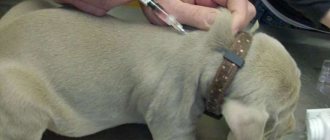Vaccination of kittens is a subject of debate for many breeders and lovers of these amazing animals. Some people are concerned about the consequences of vaccination, while others are afraid that their pet will feel unwell after the injection. Such fears are unfounded. Despite the fact that vaccinations can cause the development of temporary illness in kittens, the benefits from them will be several times greater. Experts insist on the need to introduce vaccines into the body of kittens and adult cats, since this is what will prevent complex infections in them and even save lives.
Vaccination rules - what you shouldn’t forget
Before you go to the doctor or vaccinate yourself, you need to make sure that the baby is completely healthy and alert:
The pet must be active and cheerful; He must certainly have a good appetite; The cat's body temperature should be normal (in cats, normal body temperature is considered to be 38-39 degrees Celsius); The animal should not sneeze or cough; During a visit to the veterinary clinic, the doctor should once again check the cat’s health. Talk to your veterinarian about when to give your first vaccination. This depends on several factors, so only a professional can give you the right advice; Before injections, the kitten must be given anthelmintic drugs. You can vaccinate 10 days after this
It is important to choose a high-quality, proven vaccine; inexpensive, but untested options can irreparably harm your pet’s health. It is best to vaccinate kittens in veterinary clinics, where specialists can take responsibility for the life and health of the animal.
It is best to vaccinate kittens in veterinary clinics, where specialists can take responsibility for the life and health of the animal.
Vaccination rules:
Only completely healthy kittens can be vaccinated; It is forbidden to give injections to pets after contact with a sick animal; After vaccination, the pet cannot undergo surgery for 21-25 days; After surgery, the cat cannot be vaccinated for 3 weeks; After taking antibiotics, vaccination is allowed only after 14 days; The vaccine should not be given while teeth are changing; It is important that the vaccine does not expire; You cannot vaccinate an animal less than 8 weeks old; The kitten should not be in a stressful state - it should not break free from your hand, scream, etc. After vaccination, you need to monitor the kitten’s condition: is it active, what is its appetite?
After vaccination, you need to monitor the kitten’s condition: is it active, what is its appetite?
After any injection, the pet may suddenly become lethargic, lose appetite, and its body temperature may rise.
The effects of vaccination disappear within a few hours, this time depends on how strong the baby’s body is at the time of vaccination.
The most common vaccines and their features:
- Nobivac Tricat is a dry combination vaccine. It is areactogenic and creates immunity in the cat against diseases such as panleukopenia, rhinotracheitis, and calicivirus infection. Administered subcutaneously or intravenously at at least 12 weeks of age.
- “Leukorifelin” is a vaccine consisting of two parts - dry and liquid, which are mixed before administration. It is highly immunogenic. From 3 months you can administer the same drug, which also induces immunity against rabies, it is called “Quadricat”.
- “Felovax-4” is a complex vaccine that does not provide immunity against rabies. Given to kittens aged 8-12 weeks. It allows you to create immunity for a period of no more than 12 months, so you need to strictly monitor the timing of revaccinations, which should be carried out once a year.
Forgetting about vaccinations is strictly prohibited, especially if they form immunity against dangerous diseases such as rabies.
Remember that no one will vaccinate your pet better than an experienced veterinarian who knows which drug is right for your pet, how best to administer it and what dose to take.
He will tell you at what age kittens are vaccinated and will be able to carry out the vaccination correctly.
Self-medication can seriously harm your pet.
Forgetting about vaccines is also strictly prohibited, especially if they form immunity against dangerous diseases such as rabies.
Every owner must remember that vaccination cannot be carried out on a sick animal or a cat that has not taken anthelmintic drugs.
May your pet always be healthy and energetic and give you joy every day!
When to vaccinate kittens: vaccination rules
Every kitten owner should know when to vaccinate kittens, what diseases a kitten is vaccinated against in the first months of life, and what you need to know before vaccination.
What is vaccination
Vaccination is the administration of a drug to an animal that is based on pathogenic bacteria or viruses. In advance, pathogenic microorganisms are artificially weakened or killed. They are introduced into the animal’s body to develop immunity to the disease carried by certain microbes. Vaccination can often save a pet's life. But do not forget that vaccination can cause complications and various undesirable effects.
Why are cats vaccinated?
Vaccinating a cat is a measure aimed at preventing possible disease. Vaccination prepares the animal to encounter harmful microorganisms by developing immunity in advance.
A virus or microbe that enters an animal’s body and begins to develop in it causes irreparable harm to vital systems. To neutralize them, the immune system begins to produce antibodies. This may take a long time, during which the pathogen already affects the body and causes irreparable harm.
It happens that the immune system cannot produce enough antibodies to neutralize pathogens. This is where vaccination comes to the rescue. Through an injection, inactive antigens (foreign substances) are introduced into the cat's body, which provoke the body to an immune response. When the immune system subsequently encounters these bacteria or viruses, it already has antibodies in its arsenal that can quickly overcome the disease without critical consequences.
Antibodies have specificity: they can neutralize only those antigens in response to which they were produced by the body
But the memory of immunity is not eternal, so revaccination (re-vaccination) is needed, which prevents the antibodies from disappearing.
Video: antigen and antibody - how the immune system works
Guarantee against infection
Any owner should know that no vaccine can provide a 100% guarantee against infection. But this fact should not become an obstacle to vaccinating an animal. This is justified by the fact that a vaccinated animal has a minimal chance of getting sick, and if it does get sick, the course of the pathology is much easier and has no lethal consequences.
Types of cat vaccines
The following vaccines are most often used to vaccinate kittens:
- Nobivac Forcat. A multicomponent vaccine that stimulates immunity in kittens to calicivirus, panleukopenia, rhinotoacheitis and chlamydia;
- Nobivac Tricat. Triple action vaccine against calicivirus infection, rhinotracheitis and panleukopenia. The first vaccination for kittens is given at the age of 8 weeks. Revaccination (repeat vaccination) should be carried out annually;
- Nobivac Tricat. It also protects the little furry from the four main diseases listed. The first vaccination for a kitten can be given at the age of 12 weeks;
- Nobivac Rabies. This type of kitten vaccine only protects against rabies. The animal develops stable immunity 21 days after vaccination. Revaccination should be carried out annually. It is acceptable to mix Nobivak Rabies with other types of Nobivak vaccines;
- FORT DODGE FEL-O-VAX IV. This is a polyvalent vaccine - against several infections. Is inactivated. Protects the cat immediately from rhinotracheitis, panleukopenia, calicivirus and chlamydia. Approved for use in kittens over 8 weeks of age. Revaccination is carried out once a year;
- Purevax RCP. A multicomponent vaccine, which included strains of rhinotracheitis, panleukopenia and calicivirosis.
- Purevax RCPCh. Contains weakened strains of the viruses listed above. The vaccine is given at the age of 8 weeks. A month later they repeat. In the future, revaccination is indicated once a year.
- Leucorifelin. Protects the animal from viral viruses and panleukopenia. It is prohibited to administer Leucorifelin with other vaccines;
- Quadricate. Vaccination for kittens against panleukopenia, rabies and calicivirus. The kitten's immunity is formed in 2-3 weeks. Repeated vaccination is carried out every year;
- Rabizin. This drug is only for rabies. Unlike other types of vaccines, Rabizin can be administered even to pregnant cats;
- Leukocel 2. Vaccine against leukemia in cats. The vaccine is given twice. Then revaccination is carried out once a year. Kittens are vaccinated at the age of 9 weeks;
- Phelocel CVR. The drug stimulates the production of immunity against rhinotracheitis, panleukopenia and calicivirus. The vaccine looks like a porous mass of pale yellow color. Before use, it is diluted with a special solvent;
- Microderm. The vaccine allows you to protect the animal from dermatophytosis (lichen, etc.).
Important: it is worth remembering that young cats under 3 years of age, as well as old and weakened animals, are always at risk
When to get your first vaccination
The first vaccination for small kittens is given at the age of two months. This is the optimal period when maternal immunity ceases to operate and the little tomboy’s body is already strong enough to form vaccine protection. It is not advisable to vaccinate a kitten yourself. This should be done by a specialist. After the injection, information about the date of vaccination, type of vaccine, series and dose will have to be entered into the animal’s special vaccination certificate.
The first immunization allows you to inoculate the kitten with immunity against several infections, in particular, calicivirus, parvovirus enteritis or canine distemper, and rhinotracheitis. He needs a second injection of the vaccine, which is carried out 7 and 21 days after the initial injection.
At what age are cats vaccinated?
Newborn kittens have so-called colostral (passive) immunity. It is provided by maternal antibodies transmitted by the mother cat through colostrum in the first 24–36 hours of life. In this case, the kitten will be protected only from those infections against which its mother was vaccinated. This immunity lasts up to a maximum of 16 weeks. Its duration depends on the amount of antibodies in the cat and the timing of its vaccinations.
Best articles: Which ocean is the smallest in area and volume on the planet?
Passive protection may prevent the kitten from developing immunity in response to the vaccine, so it is not advisable to vaccinate before 10 weeks of age. Another reason why it is not advisable to administer the vaccine early is the immature lymphoid tissue system, which is unable to effectively produce antibodies. It is believed that a good immune response to vaccination can be obtained only after the kitten is two months old.
If there is a high risk of disease, then vaccination is carried out earlier - after 6 weeks, during the period when the kitten is still consuming mother’s milk and has not been weaned from the cat. The fact is that antibodies are produced after several weeks, so between 6 and 16 weeks the kitten is most vulnerable. After all, maternal immunity no longer protects, and our own has not yet developed.
Vaccinations for cats by age (table)
What vaccinations are given to cats up to one year old and when exactly? When constructing a vaccination scheme, many factors are important: where the kitten will live, against what diseases and how long ago its mother was vaccinated, whether there is a threat of infection, whether the area is free from infectious diseases. The average vaccination schedule for cats is as follows.
- 9–12 weeks - the first vaccination against respiratory viral infections (rinotracheitis, calcivirosis) and panleukopenia.
- At the age of 12 weeks - vaccination against rabies.
- Repeated vaccination against respiratory viral infections (rinotracheitis, calcivirosis) and panleukopenia is carried out 2-4 weeks after the first.
- Vaccinations are then given every year 11–12 months after the last vaccination.
| Disease | First vaccination | Second vaccination | Revaccination |
| calcivirus | 9–12 weeks | in 2–4 weeks | annually |
| rhinotracheitis | 9–12 weeks | in 2–4 weeks | annually |
| panleukopenia | 9–12 weeks | in 2–4 weeks | annually |
| rabies | 12 weeks | 1–3 years | |
| chlamydia | 9–12 weeks | in 2–4 weeks | annually |
| infectious peritonitis | 16 weeks | 20 weeks | annually |
| trichophytosis and microsporia (p. lichen) | 8 weeks | 10 weeks | annually |
If necessary, chlamydia can be added to three viral diseases at the same time.
If there is a risk of infection with ringworm, then an additional vaccination against this disease is given at 8 and 10 weeks.
In areas where feline infectious peritonitis is common, the vaccine against this virus is administered at 16 and 20 weeks of age.
The timing may vary slightly depending on the specific vaccine chosen. All manufacturers include detailed instructions with the drug indicating the timing of vaccination and revaccination, measures to prepare for vaccination, a list of adverse reactions and what to do in case of complications after antigen administration.
What diseases should it be treated for?
There is a list of mandatory diseases for which you need to be vaccinated.
They cause severe complications, including death.
These terrible diseases include:
- Panleukopenia (commonly known as plague). The number of leukocytes in a cat's blood decreases, which in most cases leads to death. Panleukopenia has a wide range of symptoms, including: lethargy, vomiting, diarrhea, loss of coordination, and refusal to eat. Treatment must be started immediately in order to save the pet in time.
- Rhinotracheitis. The disease is caused by a virus and provokes the following symptoms: high fever, refusal to eat due to loss of smell, spasm of the muscles of the eyelid, which is why the animal always keeps its eye closed, the appearance of ulcers and inflammation of the cornea. The eyes and upper respiratory tract are affected.
- Calcivirosis. An infectious disease that results in fever, conjunctivitis, lameness, and ulcers on the mucous membranes of the mouth and nose.
- Rabies. A well-known disease that is also dangerous for humans. Symptoms of rabies: flow of saliva, sudden aggressiveness, vomiting. At the last stage of the disease, the cat cannot eat because paralysis of the larynx begins. As a result, the unfortunate animal dies from cessation of breathing or general exhaustion of the body.
Are there any complications or side effects?
Only 0.5 - 1% of all animals vaccinated against common diseases annually are susceptible to complications or side effects. And the correct use of drugs, the high qualifications of the supervising doctor and the attentiveness of the owner when preparing the animal for the procedure can reduce the likelihood of adverse events to zero.
For the sake of health, you can be patient
But even if the probability is low, it is worth preparing for the possible consequences in advance. Here is a list of common complications from vaccination:
Allergic reaction
Symptoms of an injection allergy appear in the first 10 to 15 minutes after injection. Characteristic signs include increased salivation, difficulty breathing, or involuntary bowel movements. As a rule, veterinarians do not advise leaving the clinic for half an hour after an injection, so that the cat can be examined in a timely manner in case of any alarming symptoms and adequate antihistamines can be prescribed.
The appearance of a lump or redness at the injection site
Such a reaction is not dangerous; the swelling usually resolves within a couple of hours. If this does not happen or an abscess forms, urgent consultation with a doctor is necessary.
Incubation
Vaccinating an already sick animal that has not yet passed the incubation period can lead to the rapid development of the disease. Quarantine, as well as a full examination by a veterinarian before vaccination, will help you avoid problems.
In addition to the manifestations listed above, a reaction to an injection can be expressed through lethargy or hyperactivity, a temporary decrease in appetite, refusal to eat for several days, a short-term increase in body temperature and a feverish state.
Possible complications after vaccination in a kitten
Each animal's body reacts differently to the vaccine. Some pets may develop the following side effects:
- apathy and loss of appetite;
- refusal of water and even your favorite food;
- increased drowsiness;
- swelling and induration at the injection site;
- increased body temperature;
- convulsive conditions;
- pleurisy and encephalitis;
- pain at the injection site;
- change in fur color at the injection site and even hair loss;
- some changes in behavior.
Important: in very rare cases, a kitten’s body does not develop immunity to infections and viruses even after vaccination, but this is an individual characteristic of the animal.
As a rule, all non-dangerous side effects go away on their own within 1-4 days after vaccination or require symptomatic treatment. For example, allergic reactions are eliminated with antihistamines. In any case, if side effects occur, you should consult your doctor for advice.
When and what vaccinations do cats get?
For preventive immunization of cats and other warm-blooded animals, poly-monovalent live, inactivated vaccines of foreign and domestic production are used. Vaccination should be carried out in a veterinary hospital, since only clinically healthy animals can be vaccinated. The veterinarian will draw up an optimal schedule of vaccinations, revaccinations, and select a veterinary drug, taking into account the age and individual characteristics of the furry pet. The cost of immunization depends on the type of vaccine, the price list of veterinarian services, and the price of a veterinary passport.
Kittens are given their first vaccinations at eight to ten weeks of age. Until this moment, babies receive protective antibodies from their mother cat. Starting from two months of age, immunity weakens, and the risk of infection by pathogenic agents increases.
After the first vaccination is given, the second kittens are vaccinated two weeks later. The third vaccination is given a month later.
Vaccination schedule up to a year
Kittens must be vaccinated against:
- rabies;
- viral rhinotracheitis;
- enteritis;
- panleukopenia (feline distemper);
- calcivirosis.
- chlamydia;
- viral leukemia;
- trichophytosis;
- microsporia.
The above diseases are considered deadly (chlamydia, rabies, leukemia) and can cause serious complications in the body and cause the death of a pet.
For immunization of cats use:
Nobivak Triket (polyvaccine against rhinotracheitis, panleukopenia, calcivirosis).
- Multifel.
- Nobivak Rabies (for rabies).
- CaliciVax (monovaccine against calvirosis);
- Leukocel (monovaccine for leukemia).
- Felovax-4 (calcivirosis, rhinotracheitis, panleukopenia).
- Leucorifelin (inactivated polyvaccine).
- Quadricate (France).
- Multifel-4 (chlamydia, rhinotracheitis, panleukopenia, calcivirosis).
The following vaccines are used for cats against microsporia and trichophytosis: Vakderm, Polivac TM, Microderm. Kittens are vaccinated up to 6 months of age.
Vaccines for cats
Walking cats are vaccinated against rabies annually, and domestic cats, depending on the veterinarian, every two to four years. Kittens are vaccinated against this deadly disease at the age of 12-13 weeks or after the change of milk teeth.
After immunization, specific immunity is formed in the animals' bodies in about 15-20 days. Subsequent revaccinations are carried out annually for cats walking on the street or once every two to three years for pets who do not leave the house or apartment. The same injection drugs are used as for preventive immunization.
All vaccinations are recorded in the veterinary passport, veterinary certificate of animals with a stamp and signature of the veterinarian.
Mr. Cat recommends: Types of vaccines
There are four types of vaccines, which determine the duration of the vaccination and the range of effects on the body.
Depending on the impact, they are distinguished: monovalent and polyvalent. They are distinguished from each other by the degree of impact, protection from one specific disease or complex protection from two or more pathologies.
There are also active and inactive vaccines. They are divided by duration of action. The former contain live but weakened strains of bacteria and viruses, while the latter contain “dead” strains. Vaccinations with non-living pathogens will have a short duration of action.
Self-selection of a vaccine is not recommended. Only an experienced veterinarian can choose the drug that is most suitable for your pet.
Vaccination of kittens in Biryulyovo
Primary vaccination of a kitten, according to therapists at the Biryulevsky Veterinary Center, requires special attention. Clinic specialists highlight several rules for successful vaccination:
- Basic rule: vaccines are administered to kittens only if the animal is completely healthy.
- Kittens are given their first vaccination at the age of 8-12 weeks. Then you need to do a revaccination.
- Further vaccinations are recommended to be repeated once a year, but without revaccination.
- If the kitten was first vaccinated at 6 months, then revaccination is not required (if vaccinated with a vaccine called Quadricat). In other cases, revaccination is required. Further vaccinations are scheduled to be performed once a year.
- Pregnant females are not vaccinated.
- 10-14 days before vaccination, kittens need to be treated for ticks and other parasites, as well as dewormed; the drugs Strong-Hold and Inspector are ideal for these tasks.
- The first vaccination of kittens should be carried out at a veterinary clinic. It is better if the injection is administered by a professional, especially for the first time for an animal; it is advisable to carry out the first vaccination against the background of diphenhydramine, to exclude allergic manifestations, up to anaphylactic shock.
Best articles: Cat family - characteristics, representatives, classification and photos
Vaccination of Scottish and British kittens
The Scots and the British are artificially bred breeds of cats, as a result of which they have almost no immunity of their own. Therefore, it is necessary to introduce all the required vaccines in childhood, since the possibility of infection is very high.
Although pets of such breeds are ornamental animals that rarely leave their homes, immunization must be taken seriously. These kittens do not need any special vaccinations. The drugs are suitable for any four-legged friend.
Do vaccinations have side effects?
Typically, dogs and cats experience some or all of the following mild side effects after receiving the vaccine, usually starting within a few hours of vaccination. If these side effects last more than a day or two or cause your pet significant discomfort, you should contact your veterinarian:
- Discomfort and local swelling at the vaccination site;
- Slight increase in temperature;
- Decreased appetite and activity;
- Sneezing, mild cough, runny nose, or other respiratory signs may appear 2-5 days after your pet receives the nasal vaccine.
More serious but less common side effects, such as allergic reactions, may occur within minutes to hours after vaccination. These reactions can be life-threatening and warrant emergency medical attention. Seek veterinary help immediately if any of these signs develop:
- Persistent vomiting or diarrhea;
- Itchy skin that may appear uneven (“hives”);
- Swelling of the head and around the muzzle, neck, or eyes;
- severe cough or difficulty breathing;
- Collapse;
- A small, hard swelling under the skin may develop at the site of a recent vaccination. It should start to disappear within a few weeks. If it persists for more than three weeks, or it seems to be getting larger, you should contact your veterinarian.
Always tell your veterinarian if your pet has had a reaction to any vaccine or medication in the past. If you are unsure about your dog or cat's lack of reactions, wait 30-60 minutes after vaccination before taking your pet home from the veterinary clinic.
Vaccination of cats is carried out against:
- rabies;
- viral rhinotracheitis;
- calicivirus;
- chlamydia;
- panleukopenia.
If you have any questions or concerns, you can always visit or call our veterinarian - they are your best resource for ensuring the health and well-being of your pets.
Call us and we will be happy to advise you:
8-495-221-81-90
8-495-221-84-70
8-499-136-19-18
Recommended vaccination
The recommended vaccine schedule includes:
- Vaccination against leukemia. Currently, veterinary medicine has developed an injection for such a dangerous disease. A mandatory rule is to donate blood before introducing protection. This is necessary in order to make sure that the cat does not have this disease. Vaccination schedule for leukemia: primary vaccination is given to 3-4 month old animals, then revaccination – after 1 month.
- An optional but recommended injection is vaccination against chlamydia. It is not a common illness that has symptoms like the flu. It should not be given to babies who have not reached 12 weeks, because they may develop a cold, leading to chronic nasal diseases. Then revaccination is carried out after 1 month.
A caring owner, in addition to preventive examinations, in order to protect the cat, must be attentive to vaccination measures. After all, there are so many different infections around that can not only harm your pet’s health, but also lead to death.
Kitten's first vaccination
Domestic and foreign veterinarians have different views on when to vaccinate a kitten for the first time.
In Europe and America, the optimal age for the first vaccination is 6-8 weeks. Our veterinarians vaccinate kittens when they reach 8-12 weeks.
They agree on one thing - if the kitten has not yet been weaned from its mother and is breastfed, then there is no need to rush with vaccinations. While the baby receives maternal antibodies from the milk of a vaccinated mother cat, they may interact with the vaccine and the vaccination will lose its effectiveness. But, as soon as the kitten is taken from the cat, it needs to be vaccinated.
Important!
Only absolutely healthy pets can be vaccinated. Kittens are vaccinated before or after the complete replacement of baby teeth.
What to do if the vaccination schedule is broken
It happens that the vaccination schedule is greatly disrupted or completely unknown. This happens if a kitten was picked up on the street, but it looks like a home, which can be judged by the presence of a collar, or if the owners simply missed the moment of re-vaccination for their pet. Here you should consult your veterinarian. The doctor will tell you how best to proceed in each specific case. Sometimes a complete repeat of the kitten vaccination schedule is required, and in some situations the doctor can make an individual decision after examining the animal.
Vaccination of cats at the clinic of Irina Onyshchuk
At the Irina Onyshchuk veterinary center you can conduct a full course of vaccination for your pet. Rabies vaccination, basic vaccines, additional medications - all this will protect your pet from the most common and dangerous infections. Before giving the injection, an experienced veterinarian at the clinic will examine the cat to rule out any contraindications.
We work around the clock, so you can visit the center at any time convenient for you. You can check prices and make an appointment by phone. Vaccination is inexpensive, but with its help you can give your animal a long and healthy life. Call, come, protect your four-legged friend from danger!
You may also be interested in:
Veterinary clinic with a hospital Take an x-ray of a dog
Rabies vaccination: when to do?
Rabies is one of the most dangerous diseases, the pathogens of which can affect the body of most animals, as well as humans. This is a deadly infection that does not give living creatures a chance to survive. The only protection against a fatal outcome is timely prevention of pathology, that is, vaccination against rabies.
Read. Vaccine for dogs under one year of age: how to administer the drug correctly, scheme
The rabies vaccine is one of the rather aggressive immune preparations. In the first days after the injection, vaccinated animals may feel general discomfort, their appetite worsens, and malaise appears. If your pet has such symptoms, then this is not a reason for concern, since after a couple of days they disappear without a trace, leaving no consequences. If you see that your pet continues to be lethargic, you need to consult a doctor.
Vaccination to prevent the disease is carried out for growing kittens who have reached 3 months of age, as well as for adult cats. It is recommended to administer the vaccine annually (some rabies vaccinations allow you to develop immunity for three years).
How is rabies transmitted?
Carriers of rabies can be wild animals (foxes, wolves) or stray animals (cats, dogs). But even a pet is susceptible to infection. This can happen while walking. If a cat has a conflict with an infected animal, and during the fight the pet is bitten and scratched, then the risk of contracting rabies increases.
An animal that is constantly in an apartment can become infected with rabies from rats or mice. When eating rodents, the danger is a virus that is located in their brain. The likelihood of catching the disease from foreign objects that have been in contact with sick animals is low, because... The rabies virus quickly dies under the influence of sunlight, chlorine, and high temperatures.
Will not help destroy the virus:
In the brain of an animal that has died of rabies, the virus can persist for up to 3 months. It poses a danger in the cold season. Therefore, in winter, it is necessary to prohibit the cat from contacting foreign objects on the street.
To prevent the disease, animals are vaccinated, and care must be taken to ensure that the cat’s behavior remains normal after vaccination. If the cat is lethargic and inactive for more than a day, you need to show it to the veterinarian.
What does the vaccine efficacy rate mean?
Vaccine manufacturers measure the effectiveness of their developments, proving that their vaccine will definitely protect against coronavirus infection. Typically, efficiency indicators are in the range of 70-95%; the Russian Sputnik V claims a figure of 91.6%. Most people think that the indicator should be taken literally: with an effectiveness of 91.6% of 100 vaccinated people, 91.6 people will become immune to the disease, and 8.4 will not. But this is a deeply erroneous opinion)).
Vaccine effectiveness measures the extent to which vaccinated people are less likely to get the disease compared to unvaccinated people.
Let’s imagine that some very contagious disease has appeared, upon contact with which 100% of those in contact become ill. In this “absolute” case, the effectiveness of the vaccine will actually directly indicate how many people among those vaccinated will not get sick.
But in real life this doesn't happen. There will definitely be a group of people who will not get sick despite being exposed to the virus. Let's assume that there will be 30% of these “naturally resistant” people, and the remaining 70% will get sick. Now let’s vaccinate and see how many people got sick despite receiving the vaccine. Let's assume that 10 people out of 100 get sick, i.e. 10%, and the remaining 90% remained healthy. It turns out that without vaccination, 70% of people got sick, and only 10% with vaccination. This reduction in the risk of getting sick shows the effectiveness of the vaccine. In order to get the reduction figure, we subtract one from the other and divide by the proportion of cases in the unvaccinated group: 70%-10%=60%/70%=85.7%. The effectiveness of the vaccine against our virtual disease is 85.7%. But as you can see, not 14.3% got sick, as one might assume (100%-85.7%), but only 10%.
In the case of the SputnikV vaccine, according to clinical trials, the probability of getting sick after vaccination is approximately 0.5%, that is, 1 case in 200 vaccinated people.
Contraindications to vaccinations
Cat owners should be aware of contraindications to preventive vaccinations. Introducing a small dose of viruses and bacteria is safe for a healthy pet. But a weakened animal that does not have a strong immune system may develop the disease. You cannot vaccinate if:
- less than 3 weeks have passed since surgery;
- less than 2 weeks have passed since the course of antibiotics;
- there was contact with a sick animal, the incubation period did not pass;
- there are signs of malaise, decreased activity, loss of appetite;
- pregnant cat feeding kittens.
Before vaccination, your pet must be examined by a doctor. It is advisable for cat owners to have a veterinary passport, which contains information about diseases and vaccinations.
You cannot use drugs that do not have labels or products that do not have certificates for preventive vaccinations. The bottles must be hermetically sealed and opened no later than 2 hours before the injection.
Owners of cats should note that an animal that does not have information about mandatory vaccinations will not be allowed to participate in exhibitions. The lack of veterinary information will create serious obstacles if you need to travel abroad with your pet.
Best articles: Structure and role of the cytoskeleton in cells
Authors of the articles: Belanta Clinic team
List of vaccines for children aged 3 to 18 years
From 3 to 18 years of age, repeated vaccinations and revaccinations are also indicated. They are necessary because the drugs used do not provide lifelong immunity.
| Age | Vaccine |
| 6 years | Mumps (mumps), measles, rubella - revaccination |
| 6-7 years | Tetanus, diphtheria – revaccination II BCG – revaccination I |
| 13 years | Viral hepatitis B, rubella |
| 14 years | Tetanus, diphtheria – revaccination III Poliomyelitis (“live” drug) – revaccination III |
The pediatrician decides whether vaccinations can be done. He evaluates whether there are any contraindications, which include:
- allergic reaction to yeast;
- newborn weight up to 2 kg;
- allergy to egg white;
- allergy to aminoglycosides;
- primary immunodeficiency;
- acute infections in the body or exacerbation of chronic diseases;
- complications from vaccinations already given;
- seizures, some diseases of the central nervous system.
In what cases is vaccination contraindicated?
Vaccination is contraindicated in the following cases:
- Up to two months of age, since kittens have not developed immunity and lymphatic systems.
- Within two weeks after contact with an infected animal. After this period, you can vaccinate your pet if signs of the disease have not appeared.
- Signs of a cold (discharge from the nose, eyes).
- Peeling on the skin, which indicates the presence of microsporia. The fungus weakens the animal's immunity.
- Pregnancy and feeding kittens.
- One month after surgery.
With proper preparation and following recommendations, vaccination has no side effects. Vaccination will prevent the disease and save the cat's life.
Key requirements for immunization
When immunizing a kitten, you should follow some rules:
- the drug can only be administered to a completely healthy pet;
- Injections are prohibited for a kitten after communicating with infected relatives;
- after immunization, surgical intervention is contraindicated for 21-25 days;
- after surgery, vaccination is not carried out for at least 21 days;
- if antibiotics are used for therapy, administration of the medication is allowed after 2 weeks;
- It is forbidden to vaccinate your pet when changing teeth;
- the vaccine should not be expired;
- It is contraindicated to vaccinate pets under 2 months of age;
- During the procedure, the baby must be calm.
Minor vaccinations for a kitten
- "Vaccinations optional" for kittens include feline leukemia (FeLV)
, feline immunodeficiency virus (FIV), feline infectious peritonitis (FIP), Chlamydophila felis, and feline Giardia (giardiasis) vaccines. - The FeLV vaccine is recommended by some veterinarians for all kittens, while others recommend the vaccine only for kittens at high risk for leukemia. The decision should be based on your pet's lifestyle and discussion with your veterinarian. Feline leukemia is a viral disease that can be transmitted to kittens from their mother or through close contact with other infected cats. Kittens should be tested for FeLV infection prior to vaccination. Vaccinations can begin in kittens between 8 and 12 weeks of age and require a booster shot repeated after three to four weeks.
- The FIV vaccine is intended for cats at high risk of the disease. FIV is a viral disease that is most often spread from cat to cat through bite wounds. Vaccination against FIV produces a positive FIV test in tests, which is indistinguishable from infected animals. Therefore, practically this type of vaccination is not recommended for routine use. Vaccinated kittens must be tested for FIV prior to vaccination. The vaccine is not 100 percent effective. The first immunodeficiency vaccine can begin in kittens at 8 weeks of age and should be given two to three weeks apart to receive three consecutive vaccine injections.
- The Chlamydophila felis (chlamydia) vaccine is only used when keeping multiple cats where the infection is known to be present. Chlamydophila felis causes conjunctivitis and breathing problems in infected kittens. The first chlamydia vaccine can be given to kittens at 9 weeks of age or older when needed and should be increased after three to four weeks.
- FIP and Giardia vaccines are not generally recommended due to questionable effectiveness and safety. These vaccinations are still being tested and are not widely used in the veterinary community.
What vaccinations should indoor and outdoor cats have?
Veterinarians advise both indoor and outdoor kittens to be given a number of vaccines; they will protect against most known diseases. Some of them must be done, others can be done at will. Study carefully and decide which vaccinations your pet needs.
Table 1. Vaccinations for adult cats and kittens
| Disease | Necessity | Symptoms of diseases | Methods of infection |
| Panleukopenia (parvivirus enteritis, plague) | Mandatory | A contagious viral disease with a severe course, which is often fatal. The pathological process is characterized by a sharp decrease in leukocytes in the blood and a critical deterioration in the condition of the immune system. | An animal can become infected everywhere, picking up the infection on the street or in the home, where it was brought along with shoes or on clothes. |
| Rhinotracheitis | Mandatory | A disease of viral etiology that affects the mucous membranes of the respiratory organs, characterized by a high mortality rate. | Airborne, contact |
| Calicivirus | Mandatory | Damage to the respiratory system, eyes and nasal passages. Leads to the development of lameness. | Airborne, household |
| Rabies | Only for animals traveling abroad | A gross disruption of the functionality of the nervous system, which in 100% of clinical cases ends in the death of the animal. | Through the saliva of an infected animal, during a bite. |
| Viral feline leukemia | Recommended | Marked decrease in immune function with disruption of the formation of all blood cells, development of malignant tumors of the lymphatic sphere and bone marrow | Intrauterine infection, through saliva, through sexual contact. |
| Chlamydia | For mating and breeding cats | Damage to the genital organs and intestines, as well as conjunctivitis and inflammation of the nasal mucosa | Through direct contact with an infected animal. |
| Infectious peritonitis | Recommended | Infection of the small intestine and peritoneum with the development of symptoms of inflammation | Fecal-oral route |
| Microsporia | Recommended | The appearance of pathological formations on the skin, which are accompanied by itching, peeling, hair loss and damage to the structure of the claws | Contact and household transmission route |
| Feline AIDS | If you stay only at home, infection is unlikely. Walking freely on the street is a must! | Suppression of natural immunity with the formation of its deficiency | Oral route through ingestion of contaminated meat |
Why do kittens need to be vaccinated?
If you have a pet and keep it exclusively at home, this does not mean that it does not need primary cat vaccination. It has been scientifically proven that infections dangerous to pets can be brought in from the street on clothes or shoes. Those pets who do not leave the premises have a much higher chance of becoming infected than those who periodically walk outside.
Many infections can be fatal, so vaccination for kittens should be the responsibility of the owner. If you visit a veterinary clinic regularly or because of any disease, then there the animal may come into contact with sick individuals and become infected. In addition, surgery (sterilization, castration, etc.) reduces the kitten’s immunity and increases the risk of disease. If you have several pets, kittens should be vaccinated as early as possible.
Thus, the first vaccination for kittens, especially if it is a complex injection, is a reliable way to prevent serious diseases.
Why is vaccination mandatory?
There is an opinion among people that if a cat does not go outside, but spends its entire life only in an apartment, there is no need for vaccinations, since there is simply no place for it to become infected with fatal diseases. It is a myth. In fact, the virus can easily end up in an apartment with the help of the owner. A person can carry dangerous bacteria on clothes and shoes.
You came running from the street, left your shoes in the corridor, the joyful cat rubbed against them, and then licked the fur. And that’s it, a completely domestic cat became infected with a serious disease. To avoid such incidents, as a result of which you may lose your beloved animal, you should get vaccinations.
In addition, in the summer, many people like to take their pets with them to the dacha, where the animals are in contact with nature and are completely defenseless against dangers.
Vaccinations in your veterinary passport are necessary if you are going to travel abroad with your animal. To participate in exhibitions, all vaccinations are also required, otherwise you will simply not be allowed to attend an event with a large number of other cats. This measure protects all animals on display from infection.
Vaccination is the introduction of a small dose of a pathogen into the cat’s body. The body resists bacteria, resulting in the production of protective forces.
WHERE TO GET VACCINATIONS FOR CATS AND KITTENS?
Vaccinations can be done at almost any veterinary clinic. There are public (local) and private. Unfortunately, state veterinary clinics have not proven themselves properly.
If you have such an opportunity, contact private ones, as they purchase a higher quality vaccine (but also, as a rule, more expensive), and the level of service is higher. They will always find time for a preliminary examination, recommendations for vaccination and care
Also, more attention is paid to cleanliness, which is no less important. I think every owner wants to bring the animal to a clean table, treated after the previous animal.
Some people practice calling a veterinarian to their home. In my opinion, this is the best option for the animal itself, because... he is not exposed to stress due to moving and there is no contact with other animals, and this is a guarantee of the pet’s health! But such a technique will require more material investment.
Vaccinate your animals on time! Let them be healthy and happy with you!
| In our cattery you can “buy a real British kitten.” We have many different colors, we will help you choose and answer all your questions! |
Vaccine "CoviVac"
To begin with, it is worth noting that the Chumakov Center is the only Russian supplier of vaccines for WHO and UNICEF. The center's main development, the polio vaccine, is used all over the world, including the USA and Europe.
The CoviVac vaccine is made from the real COVID-19 virus, which is specially grown and then chemically “killed” (officially called inactivated virus). Inactivation is the oldest and most well-established method of creating vaccines. The disadvantage of inactivated vaccines is their inability to penetrate cells and form T-cell immunity; they only trigger the production of antibodies.
According to the staff of the Chumakov Center, the strongest and most aggressive virus that they could find in patients was selected as a sample for cultivation. At the same time, CoviVac will be effective not only against the original virus, but also against its modifications.
CoviVac is administered twice with an interval of 14 days; immunity to coronavirus infection appears on the 28th day after vaccination.
Clinical trial results have not yet been published. For now, we have to rely on statements made by vaccine developers or officials. According to preliminary data, the effectiveness of CoviVac is 90%, and tests “confirmed the complete safety and low reactogenicity of this drug.” But, unlike EpiVacCorona, this drug is more credible due to the use of a long-known vaccine production technique.
There is no point in counting on mass production of this vaccine. Due to the need to grow a live virus, conventional companies cannot be involved in the vaccine production process. Most likely, the Chumakov Center itself will produce CoviVac. It is now planned to produce 10 million doses of the vaccine per year.
Vaccination schedule
Immunity to infections is divided into passive and active. The first is acquired from the outside and has a temporary effect. The second is produced independently by successfully combating a viral agent. The safest way to obtain active immunity is preventive vaccination of cats.
Kitten's first vaccination
Passive immunity is transmitted to newborns from the mother through colostrum and lasts up to 4 months. When should kittens have their first vaccinations? Usually this is 2-2.5 months old. They are vaccinated against all diseases on the mandatory list, except rabies.
To consolidate the result, revaccination (re-vaccination) is carried out after 3-4 weeks. It helps increase the amount of antibodies needed to fight infections. Most often, the rabies vaccine for cats is administered together with others during revaccination, but not earlier than 3 months.
Kittens up to one year old
Up to a year, vaccination of kittens involves the use of all mandatory vaccines followed by revaccination. The recommended vaccination schedule for cats by age is presented in the table:
| Disease | Duration of first vaccination (month) | Revaccination period |
| Rabies | 3 | – |
| Panleukopenia (distemper) | 2-3 | 15-30 days |
| Calcivirosis | 2-3 | 15-30 days |
| Rhinotracheitis | 2-3 | 15-30 days |
The vaccination schedule for kittens is compiled by a veterinarian. Depending on the risk of infection in the place of residence, he may add other vaccines from the additional list.
Adults
If the first vaccination of a cat is carried out already in adulthood, then the scheme for constructing its schedule is similar. After the first and repeated injections, the procedures become annual.
Why is vaccination needed?
Vaccination is a procedure in which a drug with a weakened virus or fungus is administered. In the future, it ensures the production of antibodies. When they accumulate, an active fight against viral and infectious diseases occurs in the animal’s body.
Vaccinations for cats can protect against the following diseases:
- from calcivirosis;
- from manifestations of rhinotracheitis;
- from panleukopenia;
- for protection against rabies.
- from chlamydia;
- from trichophytosis and microsporia.
- from infectious peritonitis
In addition, vaccinations for cats are required when flying with a pet on an airplane, for transportation on a train, for traveling abroad, and for international trips. In these cases, when going through customs control, the owner will be asked for a passport for the cat, which will contain all the necessary vaccinations.











